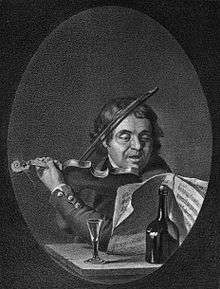Bröderna fara väl vilse ibland

 |
Melody of Epistle 35
|
| Problems playing this file? See media help. | |
Bröderna fara väl vilse ibland (Brothers lose their way at times), is one of the Swedish poet and performer Carl Michael Bellman's best-known and best-loved songs, from his 1790 collection, Fredman's Epistles, where it is No. 35.
The epistle is subtitled "Angående sin Sköna och hännes obeständighet." (About his beautiful girl, and her unreliability). The first verse ends "My girl has forgotten me, I'll die faithful. Night and day in drunkenness, shall all my sorrow pass away."
Context
Carl Michael Bellman is the central figure in Swedish song, known for his 1790 Fredman's Epistles and his 1791 Fredman's Songs. He played the cittern, accompanying himself as he performed his songs at the royal court.[1]
Jean Fredman is a fictional character and the supposed narrator in Bellman's epistles and songs, based on a real watchmaker of Bellman's Stockholm.[2] The epistles paint a picture of the demimonde life of the city during the eighteenth century, where strong drink and beautiful "nymphs" like Ulla Winblad create a rococo picture of life, blending classical allusion and pastoral description with harsh reality.[1][2]
Song
The tune is a variant of a melody from Laujon's opera Silvie, Act II, Scene 5.[3][4] The Epistle has five verses, each of twelve lines. The rhyming pattern is ABAA-ABAA-CBCC.[5] The Epistle is dated 14 December 1771.[3]
The Epistle paints a picture of a man (the watchmaker Fredman) at the end of his wits, disappointed in love, trying to forget his feelings in drink, and recalling how he "gave her gifts and gold". He compares himself to a bird snared in a trap "and I scarcely even have death as a friend". In the last verse he recalls her skin "and her eyes' burning games" he feels his heart "heavy as lead", but at last he curses her: "Damn you for betraying me!", and says enough.[6]
The musicologist James Massengale points out that in this Epistle, Bellman has used a panoply of metrical devices to counteract the "metrically plodding melody". He uses anadiplosis (repeating the last word of a clause at the start of the next) in verse 3 with "...skaffa jag barnet; barnet det dog,..." and again in verse 4; he uses epanalepsis (repeating the first word of a clause at its end) in verse 3, with "Men, min Anna Greta, men!", and again in verse 5; and anaphora (repeating a word at the starts of neighbouring clauses) in verse 4, "häll den på hjärtat, häll man fyra!", and again in verse 5. Massengale observes that good musical poetry, like this Epistle, is always a compromise, as it has both to fit its music or be no good as a musical setting, and to contrast with its music, or be no good as poetry. The final verse, containing all three metrical devices, is not, argues Massengale, an example of "decay", but shows Bellman's freedom, change of focus (from lament to acceptance), and the closure of the Epistle.[7]
Reception
The literary historian Lars Warme observes that a Bellman Epistle "is related to a drinking song only by derivation. As an artistic achievement [the form] stands alone in the history of Swedish poetry." Warme chooses Epistle 35 as an example of a work risen far above "a drinking song", translating the start of the poem as:[8]
The brethren lose their way at times
'Mongst glasses, but never 'mongst taverns;
All of them make it to wine-grapes' land.
Drink, brethren, drink just a bit.
Hear how they totter and scrape in the sand,
Fumble at door latches, bang with their fists,
Stagger and stumble with tankard in hand,
Bleeding from biting their tongues.
Father Movitz, top off my glass!
My lass has forgotten me, I'll die faithful.[8]
The first couplet is a humorous play on a verse from a Biblical Epistle, James 1:16, which runs:[3]
- Do not go astray, my beloved brethren.
The verse meant that the brothers should not fall into sin. Bellman's Epistle, however, supposes that going astray meant picking up the wrong glass in a tavern.[3]
The song has been recorded by Fred Åkerström, differently on two albums, Fred sjunger Bellman and Glimmande nymf; writing in Dagens Nyheter, Martin Stugart observes that Åkerström's "rumbling throat" gave the text new life and depth, and that audiences "couldn't get enough of his interpretations" of the song, alongside other favourites like "Ack, du min moder" and "Glimmande nymf".[9]
Other solo singers who have recorded the Epistle include Sven-Bertil Taube, and Cornelis Vreeswijk.[10] Many recordings of Epistle 35 have been placed on YouTube.[11] It has been translated into English by Eva Toller.[12]
Jennie Nell, writing for the Bellman Society, describes Epistles 35 and 43 ("värm mer öl och bröd") as undoubtedly the most radical and innovative. They were often chosen by female singers in the twentieth century, picking up on Fredman's "perplexed and troubled" voice. Epistle 35 in particular has, writes Nell, often been portrayed with "a comic undertone", but in fact it expresses "dark feelings" of jealousy, anger, and sadness, as Fredman, dropped by his lover, tries to dull his despair with drink.[13]
References
- 1 2 "Carl Michael Bellmans liv och verk. En minibiografi (The Life and Works of Carl Michael Bellman. A Short Biography)" (in Swedish). The Bellman Society. Retrieved 25 April 2015.
- 1 2 Britten Austin, 1967. Chapter 3: Fredman's Epistles, pp 61-93.
- 1 2 3 4 "Epistel N:o 35". Bellman.net. Retrieved 18 March 2016.
- ↑ Massengale, pages 175–176
- ↑ Bellman, 1790.
- ↑ Bellman, 1790.
- ↑ Massengale, pages 147–148
- 1 2 Warme, Lars G. (1996). A History of Swedish Literature. University of Nebraska Press. pp. 124–127. ISBN 0-8032-4750-8.
- ↑ Stugart, Martin (5 December 2005). "FRÅGA OM STOCKHOLM: Ingen sjöng Bellman som Fred Åkerström" [Question of Stockholm: Nobody sang Bellman like Fred Åkerström]. Dagens Nyheter. Retrieved 19 March 2016.
- ↑ Hassler and Dahl, page 284
- ↑ "Bröderna fara väl vilse ibland". YouTube. Retrieved 19 March 2016.
- ↑ Tolle r, Eva. "Bröderna Fara Väl Vilse Ibland – Epistel Nr 35" (PDF). Eva Toller. Retrieved 19 March 2016.
- ↑ Nell, Jennie. "Recension: Gutår Båd Natt och Dag" (in Swedish). The Bellman Society. Archived from the original on 4 March 2016. Retrieved 19 March 2016. earlier published in Hwad Behagas? no 3–4, 2015
Sources
- Bellman, Carl Michael (1790). Fredmans epistlar. Stockholm: By Royal Privilege.
- Britten Austin, Paul. The Life and Songs of Carl Michael Bellman: Genius of the Swedish Rococo. Allhem, Malmö American-Scandinavian Foundation, New York, 1967. ISBN 978-3-932759-00-0
- Britten Austin, Paul. Fredman's Epistles and Songs. Stockholm: Proprius, 1990 and 1999.
- Hassler, Göran; Peter Dahl (illus.) (1989). Bellman – en antologi [Bellman – an anthology]. En bok för alla. ISBN 91-7448-742-6. (contains the most popular Epistles and Songs, in Swedish, with sheet music)
- Hassler, Göran; Peter Dahl (illus.) (1989). Bellman II – en antologi [Bellman – an anthology]. En bok för alla. ISBN 91-7448-837-6. (contains the remaining Epistles and Songs, in Swedish, with sheet music)
- Kleveland, Åse; Svenolov Ehrén (illus.) (1984). Fredmans epistlar & sånger [The songs and epistles of Fredman]. Stockholm: Informationsförlaget. ISBN 91-7736-059-1. (with facsimiles of sheet music from first editions in 1790, 1791)
- Massengale, James Rhea (1979). The Musical-Poetic Method of Carl Michael Bellman. Stockholm: Almqvist & Wiksell International. ISBN 91-554-0849-4.
